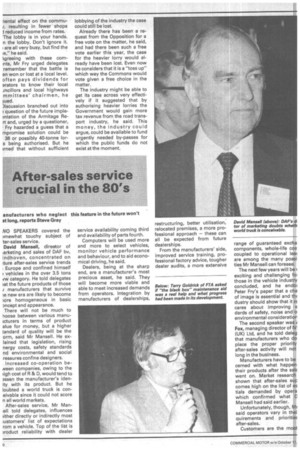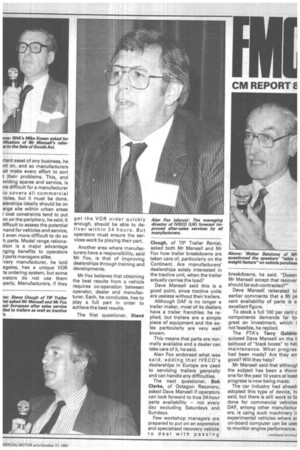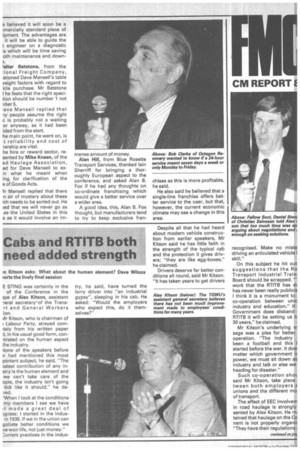anufacturers who neglect this feature in the future won't st
Page 22

Page 23

Page 24

If you've noticed an error in this article please click here to report it so we can fix it.
long, reports Steve Gray NO SPEAKERS covered the wnewhat touchy subject of ter-sales service.
David Mansell, direotor of larketing and sales of DAF by, indhoven, concentrated on rture after-sales service trends Europe and confined himself vehicles in the over 3.5 tons vw category. He told delegates at the future products of those / manufacturers that survive se new era are likely to become lore homogeneous in basic Dncept and appearance.
There will not be much to loose between various menuicturers in terms of product alue for money, but a higher tandard of quality will be the orm, said Mr Mansell. He exlained that legislation, rising nergy costs, safety standards nd environmental and social ressures confine designers.
Increased co-operation beNeen companies, owing to the ligh cost of R & D, would tend to ossen the manufacturer's idenity with its product. But he loubted a world truck is coneivable since it could not score n all world markets.
After-sales service, Mr Man:ell told delegates, influences :ither directly or indirectly most :ustomers' list of expectations rom a vehicle. Top of the list is )roduct reliability with dealer service availability coming third and availability of parts fourth.
Computers will be used more and more to select vehicles, monitor vehicle performance and behaviour, and to aid economical driving, he said.
Dealers, being at the sharp end, are a manufacturer's most precious asset, he said. They will become more viable and able to meet increased demands from operators. Integration by manufacturers of dealerships, restructuring, better utilisation, relocated premises, a more professional approach — these can all be expected from future dealerships.
From the manufacturers' side, improved service training, professional factory advice, tougher dealer audits, a more extensive range of guaranteed excha components, whole-life cos coupled to operational lea; are among the many possi ties Mr Mansell can foresee. The next few years will be exciting and challenging fol those in the vehicle industry
concluded, and he endoi Peter Fry's paper that a cha of image is essential and thr dustry should show that it irE cares about improving s dards of safety, noise and' o environmental consideratior
The second speaker was Fox, managing director of IV' (UK) Ltd, and he told deleg that manufacturers who do place the proper priority after-sales activity will not long in the business.
Manufacturers have to be cerned with what happen their products after the salE went on. Market research shown that after-sales sup comes high on the list of es tials demanded by opera which confirmed what 0 Mansell had said earlier.
Unfortunately, though, Mr said operators vary in thei quirements and prioritirm after-sales.
Customers are the most
rtant asset of any business, he !nt on, and so manufacturers Jst make every effort to sort t their problems. This, and Adding spares and service, is )re difficult for a manufacturer to covers all commercial 'ides, but it must be done. alerships ideally should be on arge site within urban areas t cost constraints tend to put !rn on the periphery, he said. It iifficult to assess the potential -nand for vehicles and service, I even more difficult to do so h parts. Model range rationaition is a major advantage nging benefits to operators
parts managers alike.
:very manufacturer, he told egates, has a unique VOR Is ordering system, but some :rators do not use them iperly. Manufacturers, if they get the VOR order quickly enough, should be able to deliver within 24 hours. But operators must ensure the services work by playing their part.
Another area where manufacturers have a responsibility, said Mr Fox, is that of improving dealerships through training and developments.
Mr Fox believes that obtaining the best results from a vehicle requires co-operation between operator, dealer and manufacturer. Each, he concludes, has to play a full part in order to achieve the best results. Clough, of TIP Trailer Rental, asked both Mr Mansell and Mr Fox how trailer breakdowns are taken care of, particularly on the Continent. Are manufacturers' dealerships solely interested in the tractive unit, when the trailer actually carries the load?
Dave Mansell said this is a good point, since tractive units are useless without their trailers.
Although DAF is no longer a trailer maker, most of its dealers have a trailer franchise, he replied, but trailers are a simple piece of equipment and the axles particularly are very well known.
This means that parts are normally available and a dealer can take care of it, he said.
Alan Fox endorsed what was said, adding that IVECO's dealerships in Europe are used to servicing trailers generally and can handle any difficulties.
The next questioner, Bob Clarke, of Octagon Recovery, asked Dave Mansell if operators can look forward to true 24-hour parts availability — not every day excluding Saturdays and Sundays.
Few workshop managers are prepared to put on an expensive and specialised recovery vehicle to deal with passing breakdowns, he said. "Doesn Mr Mansell accept that recover should be sub-contracted?"
Dave Mansell reiterated hi earlier comments that a 95 pc cent availability of parts is a excellent figure.
To stock a full 100 per cent c components demands far to' great an investment, which i not feasible, he replied.
The FTA's Terry Goldrie quizzed Dave Mansell on the Ii kelihood of "black boxes" to hell maintenance. What progres had been made? Are they an, good? Will they help?
Mr Mansell said that althougl the subject has been a thorn, one for the past 10 years at least progress is now being made.
The car industry had afread) adopted this type of device, h( said, but there is still work to b( done for commercial vehicles DAF, among other manufactur ers, is using such machinery ir experimental vehicles where ar on-board computer can be use( to monitor engine performance.
a believed it will soon be a imercially standard piece of ipment. The advantages are it will be able to guide the t engineer on a diagnostic :s which will be time saving 0th maintenance and down
rafter Batstone, from the :ional Freight Company, stioned Dave Mansell's table veight factors with regard to icle purchase. Mr Batstone I he feels that the right specition should be number 1 not iber 5.
Jaye Mansell replied that iy people assume the right c is probably not a waiting or anyway, as it had been ided from the start.
he main point, he went on, is t reliability and cost of iership are vital.
he hire or reward sector, resented by Mike Kneen, of the ad Haulage Association, ed for Dave Mansell to exn what he meant when ing for clarification of the e of Goods Acts.
1r Mansell replied that there n air of mystery about these Ich needs to be sorted out. He )ed that we will never go as as the United States in this a as it would involve an im mense amount of money.
Alan Hill, from Blue Rosette Transport Services, thanked lain Sherriff for bringing a thoroughly European aspect to the conference, and asked Alan B. Fox if he had any thoughts on co-ordinate franchising which would give a better service over a wider area.
A good idea, this, Alan B. Fox thought, but manufacturers tend to try to keep exclusive fran chises as this is more profitable, he said.
He also said he believed that a single-line franchise offers better service to the user, but that, however, the current economic climate may see a change in this area.








































